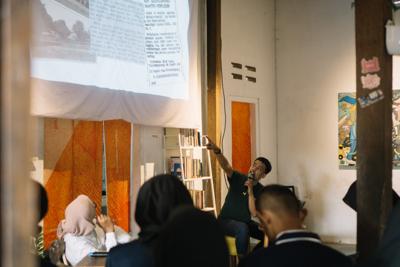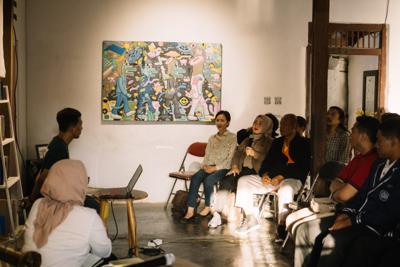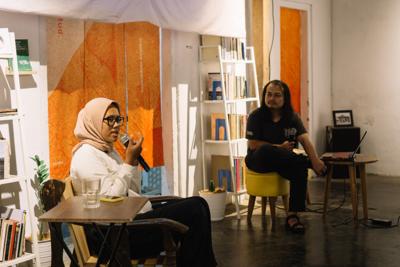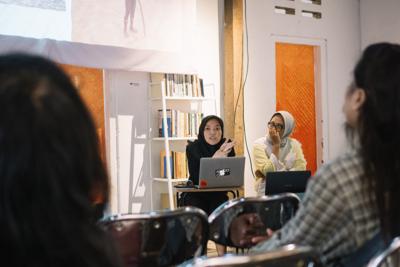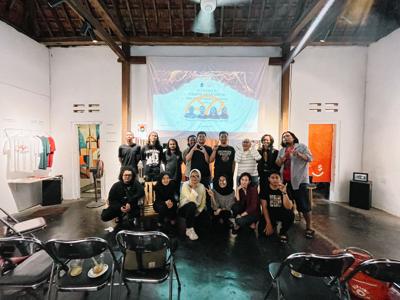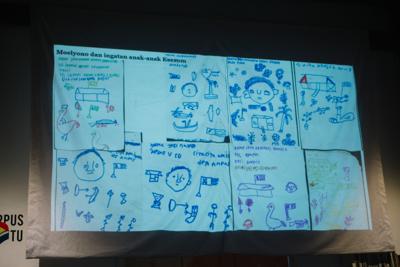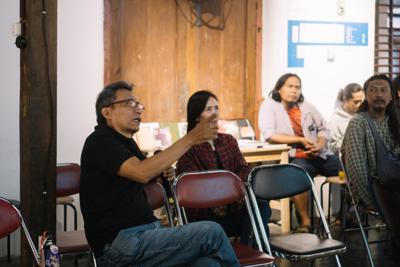Gatari Surya Kusuma
9 folders, 15 files
information about you and your project in general
-
research
-
-
New text file.md
Series of Workshops: Speculative Fiction On Indonesian Photo Archives
Background
Through a Rautenstrauch-Joest Museum collection about Indonesian photography archives, shows various locations, activities, and stories from unidentified year and specific location. All the archives been circulated through a fellowship program titled Leaky Archives. As a curator, I am seeing this archives to redistribute to those who are living closer to the context. I am working with a photography editor to make a compilation of speculative fiction photobook and a group of researcher and curator to conduct a workshop in East Java–where some of the photos are located. Instead of defining the archive through the truth of archives, I would like to discuss what kind of speculative fiction that we could create from these archives. The fiction constructed by the myth, folklore, oral histories that lingered around the communities. On this case, fiction becomes a way to position that community narrative could be a matters to define their own histories instead of depend to the material archives which defined by the colonial.
Speakers
Riksa Afiaty, a curator who are mostly working in the decolonization discourses within Indonesia. Especially the relation between Indonesia with Papua
Benny Widyo, a curator who is based in East Java and conducted a project to gather the local myth and community narratives in Tulungagung
Prasetya Yudha, a photobook publisher called SOKONG! which focuses on publishing the photobook based in Yogyakarta, Indonesia.
-
-
workshop
Series of Workshops: Speculative Fiction On Indonesian Photo Archives
Background
Through a Rautenstrauch-Joest Museum collection about Indonesian photography archives, shows various locations, activities, and stories from unidentified year and specific location. All the archives been circulated through a fellowship program titled Leaky Archives. As a curator, I am seeing this archives to redistribute to those who are living closer to the context. I am working with a photography editor to make a compilation of speculative fiction photobook and a group of researcher and curator to conduct a workshop in East Java–where some of the photos are located. Instead of defining the archive through the truth of archives, I would like to discuss what kind of speculative fiction that we could create from these archives. The fiction constructed by the myth, folklore, oral histories that lingered around the communities. On this case, fiction becomes a way to position that community narrative could be a matters to define their own histories instead of depend to the material archives which defined by the colonial.
Speakers
Riksa Afiaty, a curator who are mostly working in the decolonization discourses within Indonesia. Especially the relation between Indonesia with Papua
Benny Widyo, a curator who is based in East Java and conducted a project to gather the local myth and community narratives in Tulungagung
Prasetya Yudha, a photobook publisher called SOKONG! which focuses on publishing the photobook based in Yogyakarta, Indonesia.
-
photos and videos
-
Documentation
-
Day 1
-
2 - 1633 - _DSC0876.jpg
![]()
-
3 - 1718 - _DSC0911.jpg
![]()
-
9 - 2140 - _DSC0998.jpg
![]()
-
Day 1 report.md
On the first day, there were two learning sessions led by Benny Widyo, Gulung Tukar and Prasetya Yudha, SOKONG! In the first session, Benny talked about his Residency project with Ella Chedburn, Somerset, UK entitled The Trees and The Wires. This project talks about the archives and myths that shape the history of Tulungagung. Another emphasis in this project is about the effort to combine archives, myths, legends to become one narrative about the history of Tulungagung.
In the second session, Prasetya Yudha (Pras) from SOKONG! Publish told about several editorial projects of photographic archives that they did. Pras also mentioned the importance of connecting personal experiences with archives and social phenomena. This session also discussed a lot about ethical responsibility in the work of creating narratives through archives, one of which is about the responsibility of knowledge that is created and will be distributed across generations.
-
-
Day 2
-
1 - 1718 - _DSC3256.jpg
![]()
-
10 - 2116 - IMG_3688.jpg
![]()
-
3 - 1735 - _DSC3274.jpg
![]()
-
4 - 1751 - _DSC3285.jpg
![]()
-
Report day 2.md
The second day of learning about archives and storytelling was presented by Riksa Afiaty, IVAA (Indonesia Visual Art Archive) and Agnisa Wisesa, State University of Malang. Riksa talked about the role of archives and artworks in the propaganda agenda concerning Papua. In addition, Riksa also invited discussion on how archives should be used to compile history for those who have not been heard or recorded.
In the second session, Agni discussed the collaboration that should be created between on-campus and off-campus academics. In archival work, there are interests of authorities over the archives and knowledge that circulate. Therefore, Agni emphasized that institutions should be more open to collaborating with archival practitioners who grow rooted in the context of archives and social issues surrounding archives.
-
-
-
-
zine
Unknown Numbers: A Visual Fiction Book About Past Archives and Their Numbers
Visual: Eri Rama Putra
Text: Gatari Surya Kusuma
After being dwelled in a thousand photography archives, I found that to find exact dates and locations are not necessary from reworking archives. All the photography archives took during colonial time through access of colonization. For further context investigation, according to world photography history, Indonesia does not have an urgency s to find camera technology because we have had another way to archiving such as a ritual, temple, myth, and folklore. Furthermore, the colonization has been destroying some of the historical material such as a notion of building monument to claim a community’s narratives, or deconstructing the people’s belief to the sacred temple through positioned temple as an object that can carried or claimed easily.
The tension between immaterial and material history becomes a concern on this publication. We do not want to put those archives as the thing that could unveil the truth. Otherwise, we do not have any established infrastructure to accept the truth. Wounds, traumas, violences, left feelings are lingered on those archives that have been distance and uprooted from us here. This publication is made from the archives, the stories that told by archives, personal history articulation, and the narratives that are circulated in Indonesia culturally. This publication will not tell about what should we do to unveil the truth, otherwise, this publication will show that fiction is one of alternative ways to show the untold figures, the forgotten feelings without any dependency to the colonial structures such as the institution authorship and the narrative that inherited since colonial era.
-
Bio Eri Rama.md
Eri Rama Putra (b.1987) familiar known as Eri who lives and works in Indonesia. Eri’s artistic practice is driven by his lens based practice and perspective while encounters with everyday life narratives. He likes to use intuition when observing objects or phenomena that he encounters in everyday life, and play the role or function of the medium. He has been exhibited his works in several exhibitions such as UNSEEN CO-OP, Amsterdam, the Netherlands; SongEun Art Space, Seoul, South Korea; and National Gallery of Indonesia, Jakarta, Indonesia. Currently, he is doing long research project about seaweed, community, and its narrative lingered around in Nusa Penida, Bali, Indonesia.
-
